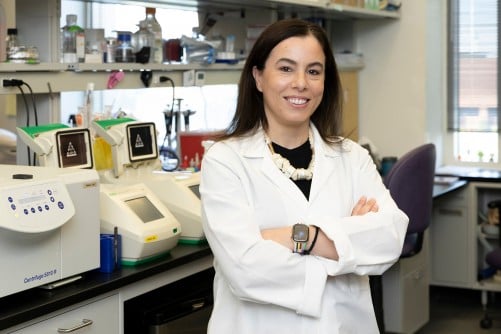
Scientists at the University of Illinois Chicago have made significant strides in understanding the aging process at a cellular level, particularly concerning blood and immune cells. Their research, published in the journal Blood, reveals that a protein called platelet factor 4 plays a crucial role in regulating the health of hematopoietic stem cells, which are essential for producing blood and immune cells. As humans age, the levels of this protein decline, leading to increased cellular mutations and potential health issues.
Understanding Hematopoietic Stem Cells
Hematopoietic stem cells reside in the bone marrow and are responsible for generating two primary types of blood cells: myeloid cells, including red blood cells and certain immune cells, and lymphoid cells, which encompass T and B cells vital for immune response. According to Sandra Pinho, an associate professor of pharmacology and regenerative medicine at UIC, these stem cells are rare and critical for immune system functionality. “We call them the Holy Grail of the immune system,” Pinho noted.
As individuals grow older, their hematopoietic stem cells tend to produce more myeloid cells and fewer lymphoid cells. This shift can lead to a compromised immune system, making older individuals less suitable as donors for bone marrow transplantation due to the decreased potency of their stem cells.
Platelet Factor 4 and Aging
The research team, led by Sen Zhang, a postdoctoral fellow in Pinho’s lab, investigated the role of platelet factor 4 in stem cell aging. Their findings indicated that this protein acts as a regulatory messenger, instructing hematopoietic stem cells to halt excessive division, particularly among those producing myeloid cells. With advancing age, the production of platelet factor 4 diminishes, which can lead to unregulated cell proliferation and an accumulation of mutations.
“When stem cells start to divide more often than they should, and if their proliferation is not regulated, they can accumulate mutations over time,” said Pinho.
These mutations can result in inflammation, increase the likelihood of blood cancers, and contribute to cardiovascular diseases. Remarkably, the researchers found that administering platelet factor 4 to older mice effectively reversed signs of aging in their hematopoietic stem cells. After a month of daily blood infusions of the protein, the mice demonstrated younger-acting immune and blood cells.
Similar results were observed when the protein was introduced to older human stem cells in laboratory experiments. “It rejuvenated the aging of the blood system,” Pinho stated.
While the effects of platelet factor 4 are promising, Pinho cautioned that it is not a standalone solution for reversing aging across all tissues or extending lifespan. Instead, it could serve as a pivotal component in broader rejuvenation strategies targeting age-related disorders.
“It’s clear evidence that it’s possible to reverse, intrinsically, certain age-associated disorders,” Pinho added. The study was co-led by Constantinos Chronis from the Department of Biochemistry and Molecular Genetics, with contributions from other UIC researchers including Charles Ayemoba, Anna Di Staulo, Kenneth Joves, Chandani Patel, Eva Leung, Maura Bueno, Xiaoping Du, and Sang-Ging Ong.







